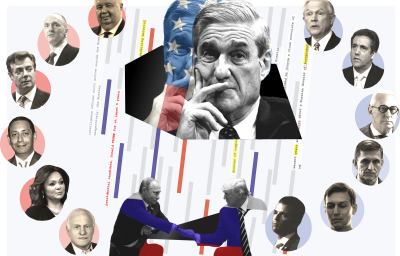Making Mugs of Voters: Mueller’s Russia Indictments

Tagged to the Trump presidency like an insistent limpet, the investigation into Russian interference in the US elections of 2016 provides constant fodder for the unimaginative political animals in the United States. But any diet that remains unvaried is bound to induce illness or nutritional deficiency. Variety is strength.
US politics, and its political culture, distinctly lacks nutritional health. Estranged, polarised, and paranoid, it has ceased being a green house of hope and governance. Little wonder, then, that its politicians see external forces of such character and effect, agents of influence that can alter the destiny of the imperium. Scant regard is paid to a system so putrescent it had to produce a Trump or conjured up the demonic properties of a Steve Bannon. Foreign interference remains, not merely a red herring but a fairly insignificant one.
On Friday, thirteen Russians and three Russian entities were charged by special counsel Robert Mueller for conspiring in interfering with “US political and electoral processes, including the presidential election of 2016.” While there was tooting and trumpeting on the media circuit, the more astute were less impressed. Various intelligence professionals preferred to see the indictments as reflecting “a different level of certainty, confidence and evidence.”
The charges, interestingly enough, omit the issue of hacked Democrat emails (Podesta and the DNC) and computer systems connected with the election itself. They focus, rather, on such housekeeping matters as fraud and identity theft.
The first count, for instance, alleges a conspiracy by the 16 defendants to defraud the United States with the purpose of “impairing, obstructing, and defeating the lawful governmental functions of the United States by dishonest means to enable the Defendants to interfere with US political and electoral processes, including the 2016 US presidential election.”
The defendants supposedly interfered with the administration of the Federal Election Campaign Act by the Federal Election Commission touching on political spending by foreign nationals during elections, the Justice Department’s overseeing of the Foreign Agent Registration Act regarding registering foreign agents working within the US on political matters, and the State Department’s visa program for foreign individuals entering the United States.
Then come charges of wire and bank fraud centred on Richard Pinedo, who operated “Auction Essistance”, an online business ostensibly formed to frustrate standard security safeguards of online payment companies. This, in turn, became the vehicle for purchasing rallies and political ads.
For Andrew Prokop, these “don’t add much to what was already publicly known about exactly how Russians tried to interference with the campaign – and they don’t contain any new allegations about anyone in Trump’s orbit.”
One entity stands out in what must be regarded as the huffing effort of an information war: the kremlobots of the Internet Research Agency, supposedly behind the various rallies, online advertisements and social media agitation. The St. Petersburg based Agency was allegedly charged with a strategy favouring Donald Trump, Bernie Sanders and Jill Stein. Hillary Clinton and Republican contenders such as Marco Rubio and Ted Cruz, were subjects of denigration.
Such a strategy, however, would not be etched in stone. The theme of chaos was central. Trump may well have been favoured, but that hardly prevented the staging of both pro-Trump and anti-Trump rallies in various parts of the country, including New York City. Dysfunction and disorientation, in other words, was exploited.
The genius of the Agency lies in the art of the masquerade, turning the Internet into a medium of dancing stories, narratives and fictions. Fake US personas were supposedly created; identities were stolen to open PayPal and bank accounts. This was politics as theatre.
What is easier to ignore in this fuss is that material, to generate any momentum, must have some pre-existing inspiration. The US political classes are continuing that now established tradition of treating those who vote them in as mugs, fools easily swayed by the next hoax or the next marketable story. This hardly charitable attitude means that changes can be avoided and electoral dissatisfaction ignored. Thank god for the Kremlin.
The nature of the indictment will be exactly what Democrats, in particular, want to hear. Trump is partly right in claiming this to be a “phony excuse for losing the election”, though detractors will naturally remove the first word of that observation. Mueller is certainly convinced that he can make these charges stick.
In of itself, these actions, including the social media campaigns and advertising, were matters of minor significance, even if they did simulate the idea of grand chaos. To suggest that they somehow tipped the balance is self-comfortingly delusional. What these indictments may well inadvertently show is that such Russian operations were a form of revenge for US meddling, notably in Ukraine in 2014. The target of that meddling was the pro-Russian leader, Viktor Yanukovych.
Then comes the actual effect of such indictments, which even hard nosed analysts admit will be minimal. As the staff at Lawfare (Feb 16) concede,
“None of the defendants indicted Friday for their alleged influence operation against the US political system is likely to ever see the inside of an American courtroom. None is in custody. None is likely to surrender to US authorities. And Vladimir Putin will probably not race to extradite them.”
The illusion of busy fury can be all powerful.
*
Dr. Binoy Kampmark was a Commonwealth Scholar at Selwyn College, Cambridge. He lectures at RMIT University, Melbourne. Email: [email protected]
Featured image is from Rantt Media.

